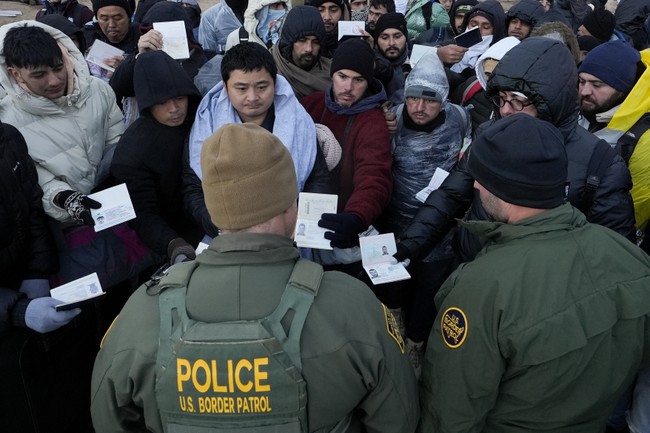Biden's Bold Asylum Order Rouses Debate
Amid soaring migrant encounters, President Biden's expected executive order to restrict asylum access at the border sparks political controversy, and legal challenges loom.
Published June 04, 2024 - 00:06am

Image recovered from redstate.com
President Joe Biden is at a pivotal moment as he prepares to take sweeping executive action addressing the ongoing challenges at the U.S.-Mexico border, an issue that has embroiled his administration in political and humanitarian debates since taking office. According to recent reports, including those from the Washington Examiner, RedState, and azcentral.com, an executive order may be announced as early as Tuesday, designed to significantly reduce the number of asylum seekers entering the United States.
The contentious plan involves a shutdown of asylum requests when encounters at the border exceed an average of 2,500 daily occurrences for a week. The White House has yet to detail the order, but the threshold approach mirrors proposals previously considered—and rejected—by Congress. Debates among lawmakers echo the complexity of immigration reform and the persistence of partisan divides, with Republicans accusing Biden of contributing to the crisis while Democrats argue for comprehensive legislative solutions over unilateral actions.
Analysis from the Arizona Republic and inquirer.com points out that mayors from several key border cities in Arizona have declined invitations to attend the announcement, highlighting a localized resistance and the potential disparate impacts of the order on border communities. Meanwhile, officials such states as Texas, represented by the Dallas News, show support as mayors confirm their attendance to the rollout in Washington.
Advocacy groups, critiques from RedState, and legal experts from across the spectrum warn of the likely legal challenges this executive order might face. The ACLU, Southern Poverty Law Center, and various immigration attorneys anticipate courtroom battles similar to those the Trump administration encountered over their immigration policies. As details continue to unfold, the nation grapples with the implications of these proposed asylum restrictions and their alignment with America's historic role as a refuge for the oppressed.
The executive order aligns in certain ways with Biden's acknowledgment of the border crisis as the top issue among U.S. voters. It also reflects the administration's struggle between maintaining humanitarian commitments and containing unprecedented migrant flows, a balancing act that will undoubtedly affect the sociopolitical landscape moving forward. With the 2024 presidential elections approaching and immigration remaining a critical topic, Biden's upcoming measures could significantly shape his presidency and the country's immigration policy.
The potential ramifications of President Biden's proposed changes are substantial, not just politically but also from a human rights perspective. The proposed executive order has sparked concern among human rights organizations such as Amnesty International and Human Rights Watch, which stress the importance of asylum as an international human right. These groups caution against policies that could lead to the forcible return of individuals to countries where they risk persecution, a violation of the principle of non-refoulement protected under international law.
Furthermore, there is substantial debate among economists and social scientists regarding the long-term impact of this new policy on the U.S. economy. While some argue that reducing the number of asylum seekers could alleviate the expenditures involved in processing and assistance programs, others highlight the positive economic contributions that immigrants, including asylum seekers, add to host communities. This includes filling labor shortages and adding to the diversity and cultural richness of the nation.
For many, the morality and ethics of the border situation are as critical as the legal implications. Religious groups and humanitarian organizations have voiced their concerns, suggesting that such strict restrictions on asylum seekers do not align with the country's values or its reputation as a haven for those seeking freedom and safety. Faith-based organizations, including the National Council of Churches and Catholic Legal Immigration Network, Inc., have been vocal in challenging policies they see as undermining human dignity and the right to seek asylum.
On the ground, entrepreneurs and business leaders from border communities have expressed worry about the impact on local economies. Border commerce and the amalgamation of cultural exchanges are vital to these areas, and there are fears that stringent immigration controls could stifle the economic vitality and cross-border trade that benefits both countries.
As the details of Biden's executive action continue to emerge, discussions have also turned towards the resources required for enforcement. Federal agencies like U.S. Customs and Border Protection and Immigration and Customs Enforcement may experience shifts in directives, possibly requiring enhanced staffing or redirection of funds. Scrutiny of the order is expected to dive into how these changes will affect operational protocols and the welfare of officers managing daily border activities.
In the international arena, Mexico and other Central American countries are closely monitoring developments, aware that U.S. policies have direct implications for their citizens and migration patterns. Diplomatic relationships hinge upon cooperative and constructive approaches to migration, and unilateral U.S. decisions could either strain or strengthen these ties. Biden's administration has signaled a commitment to working with regional partners to address the root causes of migration, but the success of these collaborative efforts remains to be seen.
Ultimately, this bold move from the Biden administration may serve as a testament to the enduring complexity of immigration issues in the United States. How the administration navigates this labyrinth of legal, ethical, and humanitarian concerns while maintaining national security and public order will be watched by voters, policymakers, and global leaders alike. As the saga at the Southern border continues to unfold, the nation waits to see how these new initiatives will redefine the immigration landscape and shape the American ethos in the years to come.







